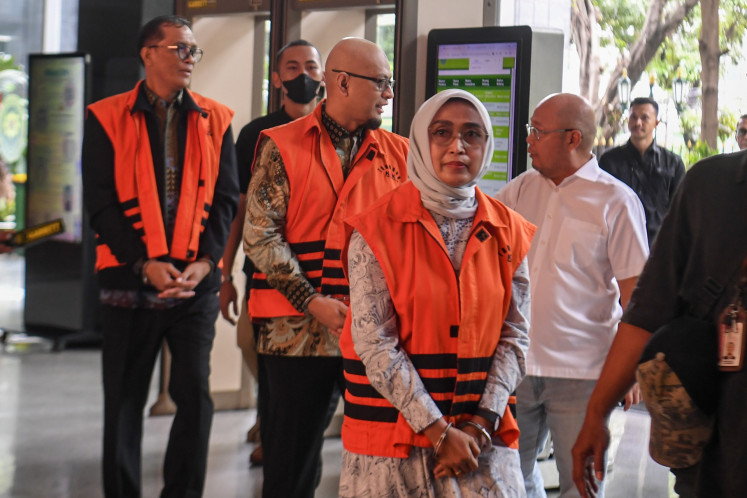Popular Reads
Top Results
Can't find what you're looking for?
View all search resultsPopular Reads
Top Results
Can't find what you're looking for?
View all search resultsIllegal abortion clinic reveals high demand amid shortage of formal facilities
The illegal clinic, in which more than 900 pregnancies were terminated since 2018, that was uncovered by the Jakarta Police recently, shows the persistent demand for abortion in Jakarta, with experts calling for the government to provide better facilities for safe procedures
Change text size
Gift Premium Articles
to Anyone
T
he illegal clinic, in which more than 900 pregnancies were terminated since 2018, that was uncovered by the Jakarta Police recently, shows the persistent demand for abortion in Jakarta, with experts calling for the government to provide better facilities for safe procedures.
Investigations are still ongoing into the clinic located on Jl. Paseban Raya in Senen district in Central Jakarta. Police arrested three suspects on Feb. 11 for allegedly facilitating illegal abortions.
The suspects are a gynecologist identified only as MM aka A, RM a midwife and S a clinic staff member. Furthermore, Jakarta Police are also on the hunt for others alleged to be involved in the case, Jakarta Police spokesman Sr. Comr. Yusri Yunus said.
The police are currently looking for another gynecologist identified only as S, and two midwives, D and IO, Yusri said, adding that around 50 midwives were believed to have taken part in the operations at the clinic.
From initial investigation, Yusri said approximately 1,600 people had visited the clinic where 900 fetuses were terminated and dumped inside a septic tank along with a chemical substance.
"The next question is whether there are still other clinics linked to this one?" he told reporters after a press briefing on Tuesday. "The special crimes division has been looking into some clinics that may be similar to this one."
He said the clients of the clinic were mostly married women with unwanted pregnancies, single women and those who had employment contracts that banned them from getting pregnant.
In 2016, the Jakarta Police closed two clinics on Jl. Cimandiri and Jl. Cisadane, respectively, in Cikini district, Central Jakarta — about 1.5 kilometers from the Paseban Raya clinic.
The Indonesian Planned Parenthood Association (PKBI) recorded 4,857 women who accessed its counselling service for terminating unplanned pregnancies between 2016 and 2017. Of the total figure, 76.1 percent were married women and the other 23.9 percent were single. Moreover, 45 percent of them said they wanted an abortion because they already had enough children.
"The demand for abortion is very high," the association's chairman, Eko Maryadi, told The Jakarta Post by phone on Tuesday. "The problem is people often do not understand the difference between pregnancies that may be terminated and those that may not."
Based on the 2009 Health Law abortion is allowed for pregnancies that pose a medical risk such as threatening the mother's or the baby's life or for pregnancy caused by a rape, which can lead to psychological trauma.
In legal abortions, women can terminate their pregnancies with the help of specialized doctors in hospitals. Moreover, safe abortion requires pre- and post-abortion counselling, in terms of the psychological and socioeconomic considerations that led to the decision, as well as the mother's health after the termination.
"There is a legal basis for abortion. That's why we call it legal but restricted," said Eko.
Despite having a legal basis, some turn to illegal abortions in medical facilities like the Paseban clinic. They go to illegal service providers because the supply of formal medical facilities cannot meet the demand, the procedures are too long and the stigma attached is too great, Eko added.
Weningtyas, the head of healthcare services at the Jakarta Health Agency said the city administration made efforts to prevent illegal abortions by educating students from elementary to senior-high school about reproductive health, raising awareness about healthy and well-prepared marriage among adults, as well as encouraging people to go to authorized medical facilities.
"The [alleged] abortion provider [on Jl. Paseban Raya] was not a clinic,” she said. "The place was not hygienic, it was messy and the medical equipment was below standard. This could result in infection, bleeding and undetected diseases."
The Institute for Criminal Justice Reform (ICJR) has pushed for a change in the government regulation on the maximum period allowable for a woman to terminate a pregnancy caused by rape, which also leads them to illegal providers. Article 31 of Government Regulation No. 61/2014 stipulates that abortion is allowed during the first 40 days after a woman’s last period.
ICJR researcher Genoveva Alicia Karisa Shiela Maya said the 40-day cap failed to accommodate women's difficulties in detecting their pregnancies, as well as a victim’s struggle to accept the fact that they had been raped and were pregnant.
"It is best to let the woman [have an abortion] regardless of how far into her pregnancy," Geno said on Tuesday. "The regulation should be flexible." (dfr)










